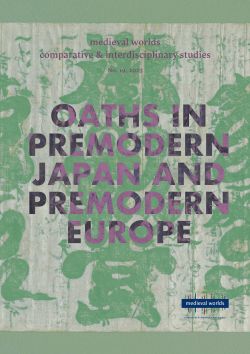|
 |
"medieval worlds" provides a forum for comparative, interdisciplinary and transcultural studies of the Middle Ages. Its aim is to overcome disciplinary boundaries, regional limits and national research traditions in Medieval Studies, to open up new spaces for discussion, and to help developing global perspectives. We focus on the period from c. 400 to 1500 CE but do not stick to rigid periodization.
medieval worlds is open to submissions of broadly comparative studies and matters of global interest, whether in single articles, companion papers, smaller clusters, or special issues on a subject of global/comparative history. We particularly invite studies of wide-ranging connectivity or comparison between different world regions.
Apart from research articles, medieval worlds publishes ongoing debates and project and conference reports on comparative medieval research.
In this volume, guest editors Philippe Buc and Thomas D. Conlan use oaths as the pivotal point for their comparative thematic section. Focusing on the differences and similarities between Japanese and European oath-taking and oath-breaking practices during the medieval period, on terminology and on chronology, Philippe Buc provides an introduction that contextualises the studies in this collection. For Japan, Yoshikawa S. and T.D. Conlan give insights into the development of the written oath (kishōmon) from its predecessors and origins in the third to sixth centuries to the sixteenth century, M. Gilbert and Horikawa Y. provide case studies of kishōmon in the heyday of its use. For Western Europe, S. Esders outlines the development of oaths from Late Antiquity to the tenth century under Christian doctrinal influence. In three case studies, H. Reimitz, H. Débax and O. Richard illustrate the use of oaths in the Early, High and Late Middle Ages.
In our individual articles section, E. Worrall, R. Kramer and T. Grant offer a new edition and commented translation of an Icelandic fragment of the Nikuláss saga erkibiskups, the Saga of Bishop Nicholas.
|




 Home
Home Print
Print
 References
References
 Share
Share
